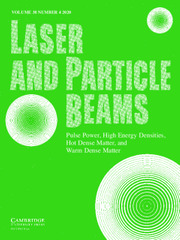Article contents
The effect of intense short pulse laser shapes on generating of the optimum wakefield and dissociation of methane molecule
Published online by Cambridge University Press: 25 May 2012
Abstract
The optimum convolution of dual short pulse for producing the maximum wakefield and the highest dissociation probability of CH4 has been investigated. By using three fundamental shapes of pulses though four different arrangements, the generated wake are considered in plasma. It is found that when the first and second pulses were rectangular–triangular and sinusoidal pulse shapes, respectively, the resultant wakefield amplitude is the highest. This effect opens up a new novel way by pulse shaping mechanism in the photo dissociation dynamics of molecules and controlling of chemical reactions in the desired channels by short pulse intense lasers for reducing the computation time of genetic algorithm model. Using field assisted dissociation model, the dissociation probability for a CH4+ molecule exposed to a 100 femtosecond 8 Jcm−2 Ti:Sapphire laser pulse is calculated. Here, the highest possible dissociation probability of the methane ion is calculated by the gradient optimization method in which the gradient of a function should be in the direction of the local extremes. The C-H molecular bond of CH4+ ion is assumed to be in the same direction as the electric field component of the laser pulse. These results show that there is an excellent match with experimental data. The remarkable feature of this work is that the sensitivity of the dissociation probability of the initial bond length q, is studied and the desired product channel is controlled by variation of the laser intensity and it's time evolution by introducing a characteristic vectored space for intensity and duration of two tailored rectangular femtosecond laser pulses.
Information
- Type
- Research Article
- Information
- Copyright
- Copyright © Cambridge University Press 2012
References
REFERENCES
- 10
- Cited by

